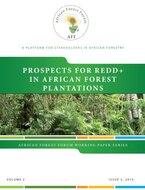This report examined the prospects of greenhouse gas mitigation in African tree Plantations, with a focus on the potential of Reducing Emissions from Deforestation and Degradation (REDD+) in Plantations.
Plantations constitute one out of every five hectares of world forests which currently add up to 4 220 million hectares. It is estimated that c. 16 million ha of plantations are growing in Africa, which is about 4% of all African forests, compared to a significantly higher global average of 7%. In recent years there has been an accelerated pace of planting in Africa, especially by the private sector and non-public actors.
Forest plantations are subject to the same factors that drive deforestation and forest degradation in general, albeit to a varying degree. This study reports that, since 1990, Africa has been losing an estimated 51 000 ha of plantations annually with a carbon stock averaging 30 t/ha. A further 200 000 ha are estimated to be in various states of degradation every year.
Interventions to reduce and/or eliminate carbon emissions through establishment of plantations could lead to substantial carbon benefits under the REDD+ programme given the eventual high carbon stocking of fast-growing plantations. Estimates using standard assumptions on carbon stocking in plantations suggest that about 40 million tonnes of CO2 could be creditable to REDD+ annually.
The study further reviewed other mitigation activities possible in African plantations and most of these will fall in the category of Nationally Appropriate Mitigation Activities agreed on in Doha in 2012. Such activities may include biomass conservation, utilisation efficiency improvements, using plantation and wood industry residues for co-generation of heat and power, complimentary possibilities to establish new plantations for the production of biofuels, as long as it does not impinge on food security and exacerbate land conflicts where the resource is scarce. It is also recommended that African countries consider expansion of plantations as a REDD+ programme to relieve pressure on natural forests.
When applied to plantations, REDD+ has less community conflicts over tenure, ownership and access given the largely public ownership of plantations in Africa.
With the extent of plantations, and the significant rates of deforestation and degradation, it is recommended that plantations be opened to all mitigation options available in the forestry sector, especially REDD+. It is thus recommended that African countries involve plantations in climate change baseline studies and include MRV issues in the regular plantation management plans.
To allow for meaningful participation of plantations in GHG mitigation, African countries should foment the policy and institutional changes necessary within the forest management system.

